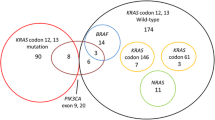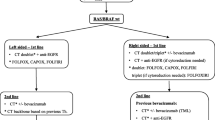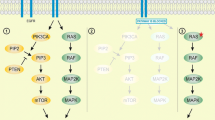Abstract
Background
K-ras proto-oncogene is commonly mutated in colorectal cancer (CRC) and has been associated with predictive markers for anti-EGFR (epidermal growth factor receptor) therapy. However, the prognostic role of K-ras status is still unclear. The aim of this study was to evaluate the association between k-ras status and addition of oxaliplatin to fluorouracil plus leucovorin (FOLFOX) chemotherapy in CRC patients with curative surgical resection.
Methods
Sixty-six patients with stage II or III CRC were treated with FOLFOX or fluorouracil plus leucovorin (FL) followed by curative surgery between January 2004 and October 2007. K-ras status was assessed by direct sequencing.
Results
Fifteen patients (22.7%) had K-ras mutations of codon 12 (11/15) or codon 13 (4/15). There were no significant differences in clinicopathological parameters, such as age, sex, stage, or adjuvant regimen between the wild-type K-ras and mutant K-ras. With a median follow-up of 41.6 months (range 25.1–72.3 months), median disease-free survival (DFS) and overall survival (OS) were not reached. With regard to K-ras status, DFS and OS were not statistically different (P = 0.269 and P = 0.917, respectively). Even in the group treated with FOLFOX only, neither DFS (P = 0.651) nor OS (P = 0.265) was significantly different according to K-ras status. With the exception of tumor location in DFS and OS, no differences in other variables were observed. Proximal colon cancer patients had a longer DFS than distal CRC patients (P = 0.079); this trend was maintained only in the wild-type K-ras group (P = 0.051).
Conclusions
These results showed that K-ras status was not associated with clinical outcome in patients treated with adjuvant FOLFOX.



Similar content being viewed by others
References
Jiang Y, Kimchi ET, Staveley-O’Carroll KF, Cheng H, Ajani JA (2009) Assessment of K-ras mutation: a step toward personalized medicine for patients with colorectal cancer. Cancer 115:3609–3617
Karapetis CS, Khambata-Ford S, Jonker DJ, O’Callaghan CJ, Tu D, Tebbutt NC, Simes RJ, Chalchal H, Shapiro JD, Robitaille S, Price TJ, Shepherd L, Au HJ, Langer C, Moore MJ, Zalcberg JR (2008) K-ras mutations and benefit from cetuximab in advanced colorectal cancer. N Engl J Med 359:1757–1765
Amado RG, Wolf M, Peeters M, Van Cutsem E, Siena S, Freeman DJ, Juan T, Sikorski R, Suggs S, Radinsky R, Patterson SD, Chang DD (2008) Wild-type KRAS is required for panitumumab efficacy in patients with metastatic colorectal cancer. J Clin Oncol 26:1626–1634
Andreyev HJ, Norman AR, Cunningham D, Oates J, Dix BR, Iacopetta BJ, Young J, Walsh T, Ward R, Hawkins N, Beranek M, Jandik P, Benamouzig R, Jullian E, Laurent-Puig P, Olschwang S, Muller O, Hoffmann I, Rabes HM, Zietz C, Troungos C, Valavanis C, Yuen ST, Ho JW, Croke CT, O’Donoghue DP, Giaretti W, Rapallo A, Russo A, Bazan V, Tanaka M, Omura K, Azuma T, Ohkusa T, Fujimori T, Ono Y, Pauly M, Faber C, Glaesener R, de Goeij AF, Arends JW, Andersen SN, Lovig T, Breivik J, Gaudernack G, Clausen OP, De Angelis PD, Meling GI, Rognum TO, Smith R, Goh HS, Font A, Rosell R, Sun XF, Zhang H, Benhattar J, Losi L, Lee JQ, Wang ST, Clarke PA, Bell S, Quirke P, Bubb VJ, Piris J, Cruickshank NR, Morton D, Fox JC, Al-Mulla F, Lees N, Hall CN, Snary D, Wilkinson K, Dillon D, Costa J, Pricolo VE, Finkelstein SD, Thebo JS, Senagore AJ, Halter SA, Wadler S, Malik S, Krtolica K, Urosevic N (2001) Kirsten ras mutations in patients with colorectal cancer: the ‘RASCAL II’ study. Br J Cancer 85:692–696
Conlin A, Smith G, Carey FA, Wolf CR, Steele RJ (2005) The prognostic significance of K-ras, p53, and APC mutations in colorectal carcinoma. Gut 54:1283–1286
Markowitz S, Hines JD, Lutterbaugh J, Myeroff L, Mackay W, Gordon N, Rustum Y, Luna E, Kleinerman J (1995) Mutant K-ras oncogenes in colon cancers Do not predict Patient’s chemotherapy response or survival. Clin Cancer Res 1:441–445
Bouzourene H, Gervaz P, Cerottini JP, Benhattar J, Chaubert P, Saraga E, Pampallona S, Bosman FT, Givel JC (2000) p53 and Ki-ras as prognostic factors for Dukes’ stage B colorectal cancer. Eur J Cancer 36:1008–1015
Tang R, Wang JY, Fan CW, Tsao KC, Chen HH, Wu CM, Chen JS, Changchien CR, Hsieh LL (2004) p53 is an independent pre-treatment markers for long-term survival in stage II and III colorectal cancers: an analysis of interaction between genetic markers and fluorouracil-based adjuvant therapy. Cancer Lett 210:101–109
Andre T, Colin P, Louvet C, Gamelin E, Bouche O, Achille E, Colbert N, Boaziz C, Piedbois P, Tubiana-Mathieu N, Boutan-Laroze A, Flesch M, Buyse M, de Gramont A (2003) Semimonthly versus monthly regimen of fluorouracil and leucovorin administered for 24 or 36 weeks as adjuvant therapy in stage II and III colon cancer: results of a randomized trial. J Clin Oncol 21:2896–2903
Comella P, Casaretti R, Sandomenico C, Avallone A, Franco L (2009) Role of oxaliplatin in the treatment of colorectal cancer. Ther Clin Risk Manag 5:229–238
Andre T, Boni C, Navarro M, Tabernero J, Hickish T, Topham C, Bonetti A, Clingan P, Bridgewater J, Rivera F, de Gramont A (2009) Improved overall survival with oxaliplatin, fluorouracil, and leucovorin as adjuvant treatment in stage II or III colon cancer in the MOSAIC trial. J Clin Oncol 27:3109–3116
Colon Cancer (2010) NCCN Clinical Practice Guidelines in Oncology
O’Connell MJ (2009) Oxaliplatin or irinotecan as adjuvant therapy for colon cancer: the results are in. J Clin Oncol 27:3082–3084
Ahnen DJ, Feigl P, Quan G, Fenoglio-Preiser C, Lovato LC, Bunn PA Jr, Stemmerman G, Wells JD, Macdonald JS, Meyskens FL Jr (1998) Ki-ras mutation and p53 overexpression predict the clinical behavior of colorectal cancer: a Southwest Oncology Group study. Cancer Res 58:1149–1158
Bleeker WA, Hayes VM, Karrenbeld A, Hofstra RM, Verlind E, Hermans J, Poppema S, Buys CH, Plukker JT (2001) Prognostic significance of K-ras and TP53 mutations in the role of adjuvant chemotherapy on survival in patients with Dukes C colon cancer. Dis Colon Rectum 44:358–363
Ogino S, Meyerhardt JA, Irahara N, Niedzwiecki D, Hollis D, Saltz LB, Mayer RJ, Schaefer P, Whittom R, Hantel A, Benson AB 3rd, Goldberg RM, Bertagnolli MM, Fuchs CS (2009) KRAS mutation in stage III colon cancer and clinical outcome following intergroup trial CALGB 89803. Clin Cancer Res 15:7322–7329
Moore HC, Haller DG (1999) Adjuvant therapy of colon cancer. Semin Oncol 26:545–555
Richman SD, Seymour MT, Chambers P, Elliott F, Daly CL, Meade AM, Taylor G, Barrett JH, Quirke P (2009) KRAS and BRAF mutations in advanced colorectal cancer are associated with poor prognosis but do not preclude benefit from oxaliplatin or irinotecan: results from the MRC FOCUS trial. J Clin Oncol 27:5931–5937
Nash GM, Gimbel M, Cohen AM, Zeng ZS, Ndubuisi MI, Nathanson DR, Ott J, Barany F, Paty PB (2009) Kras mutation and microsatellite instability: two genetic markers of early tumor development that influence the prognosis of colorectal cancer. Ann Surg Oncol 8:8
Bazan V, Migliavacca M, Zanna I, Tubiolo C, Grassi N, Latteri MA, La Farina M, Albanese I, Dardanoni G, Salerno S, Tomasino RM, Labianca R, Gebbia N, Russo A (2002) Specific codon 13 K-ras mutations are predictive of clinical outcome in colorectal cancer patients, whereas codon 12 K-ras mutations are associated with mucinous histotype. Ann Oncol 13:1438–1446
Oh HE, Cho SJ, Won NH, Lee D, Kim I, Yeom BW (2001) K-ras gene mutations and expression of K-ras, p16, Cyclin D1 and p53 in synchronous lesions of the colon adenoma carcinoma sequences. The Korean Journal of Pathology 35:291–298
Jeon CH, Lee HI, Shin IH, Park JW (2008) Genetic alterations of APC, K-ras, p53, MSI, and MAGE in Korean colorectal cancer patients. Int J Colorectal Dis 23:29–35
Anwar S, Frayling IM, Scott NA, Carlson GL (2004) Systematic review of genetic influences on the prognosis of colorectal cancer. Br J Surg 91:1275–1291
Ahn MJ, Park BB, Ahn JS, Kim SW, Kim HT, Lee JS, Kang JH, Cho JY, Song HS, Park SH, Sohn CH, Shin SW, Choi JH, Ki CS, Park CK, Holmes AJ, Janne PA, Park K (2008) Are there any ethnic differences in molecular predictors of erlotinib efficacy in advanced non-small cell lung cancer? Clin Cancer Res 14:3860–3866
Klampfer L, Swaby LA, Huang J, Sasazuki T, Shirasawa S, Augenlicht L (2005) Oncogenic Ras increases sensitivity of colon cancer cells to 5-FU-induced apoptosis. Oncogene 24:3932–3941
Nemunaitis J, Cox J, Meyer W, Courtney A, Mues G (1997) Irinotecan hydrochloride (CPT-11) resistance identified by K-ras mutation in patients with progressive colon cancer after treatment with 5-fluorouracil (5-FU). Am J Clin Oncol 20:527–529
Smith G, Carey FA, Beattie J, Wilkie MJ, Lightfoot TJ, Coxhead J, Garner RC, Steele RJ, Wolf CR (2002) Mutations in APC, Kirsten-ras, and p53-alternative genetic pathways to colorectal cancer. Proc Natl Acad Sci USA 99:9433–9438
Gnanasampanthan G, Elsaleh H, McCaul K, Iacopetta B (2001) Ki-ras mutation type and the survival benefit from adjuvant chemotherapy in Dukes’ C colorectal cancer. J Pathol 195:543–548
Harada K, Hiraoka S, Kato J, Horii J, Fujita H, Sakaguchi K, Shiratori Y (2007) Genetic and epigenetic alterations of Ras signalling pathway in colorectal neoplasia: analysis based on tumour clinicopathological features. Br J Cancer 97:1425–1431
Miranda E, Destro A, Malesci A, Balladore E, Bianchi P, Baryshnikova E, Franchi G, Morenghi E, Laghi L, Gennari L, Roncalli M (2006) Genetic and epigenetic changes in primary metastatic and nonmetastatic colorectal cancer. Br J Cancer 95:1101–1107
Glebov OK, Rodriguez LM, Nakahara K, Jenkins J, Cliatt J, Humbyrd CJ, DeNobile J, Soballe P, Simon R, Wright G, Lynch P, Patterson S, Lynch H, Gallinger S, Buchbinder A, Gordon G, Hawk E, Kirsch IR (2003) Distinguishing right from left colon by the pattern of gene expression. Cancer Epidemiol Biomarkers Prev 12:755–762
Calcagno SR, Li S, Colon M, Kreinest PA, Thompson EA, Fields AP, Murray NR (2008) Oncogenic K-ras promotes early carcinogenesis in the mouse proximal colon. Int J Cancer 122:2462–2470
Turaga K, Shibata D (2009) K-Ras and MSI: potential markers of both patient prognosis and treatment efficacy. Ann Surg Oncol 20:20
Popat S, Hubner R, Houlston RS (2005) Systematic review of microsatellite instability and colorectal cancer prognosis. J Clin Oncol 23:609–618
Dempke W, Voigt W, Grothey A, Hill BT, Schmoll HJ (2000) Cisplatin resistance and oncogenes—a review. Anticancer Drugs 11:225–236
Levy E, Baroche C, Barret JM, Alapetite C, Salles B, Averbeck D, Moustacchi E (1994) Activated ras oncogene and specifically acquired resistance to cisplatin in human mammary epithelial cells: induction of DNA cross-links and their repair. Carcinogenesis 15:845–850
Youn CK, Kim MH, Cho HJ, Kim HB, Chang IY, Chung MH, You HJ (2004) Oncogenic H-Ras up-regulates expression of ERCC1 to protect cells from platinum-based anticancer agents. Cancer Res 64:4849–4857
Acknowledgments
In Kyu Lee wishes to acknowledge the financial support of Sang Yoon Lee research fund, Department of Surgery, the Catholic University School of Medicine.
Author information
Authors and Affiliations
Corresponding author
Additional information
Myung Hee Chang and In Kyu Lee contributed equally to the work presented here.
Rights and permissions
About this article
Cite this article
Chang, M.H., Lee, I.K., Si, Y. et al. Clinical impact of K-ras mutation in colorectal cancer patients treated with adjuvant FOLFOX. Cancer Chemother Pharmacol 68, 317–323 (2011). https://doi.org/10.1007/s00280-010-1496-5
Received:
Accepted:
Published:
Issue Date:
DOI: https://doi.org/10.1007/s00280-010-1496-5




